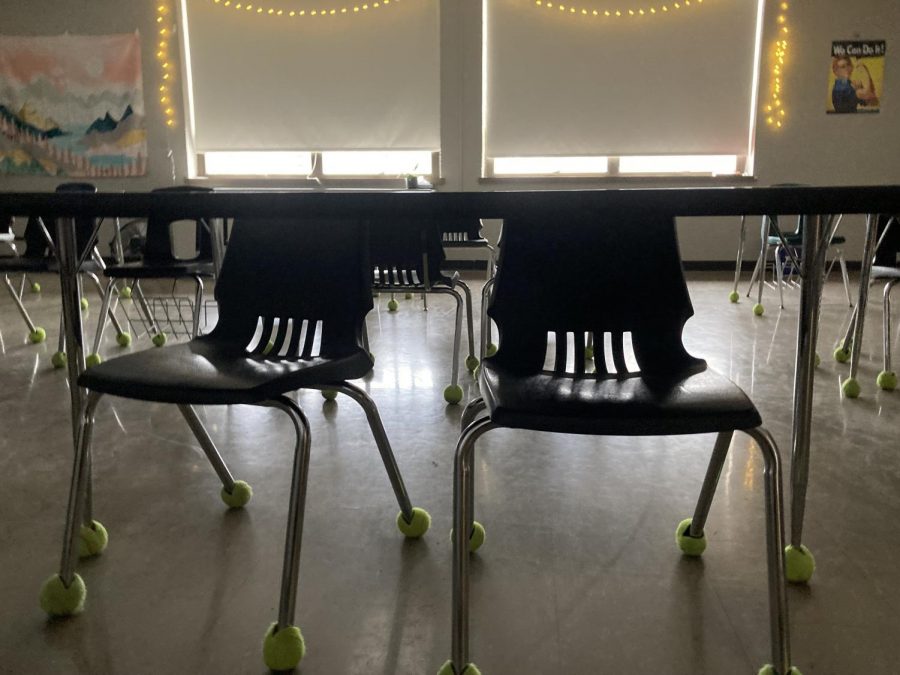Students and Support Staff Struggle Amid Pandemic Staffing Shortages
December 21, 2021
Like many other schools in Vermont, Essex High School is currently suffering from a severe staffing shortage. One of the departments that has struggled the most to hire and retain staff is Student Support Services. This department employs instructional assistants, mainstream teaching assistants, and behavioral interventionists who help students access their education and ensure that students receive accommodations and support that is legally required. According to WCAX, as of the end of October, Essex High School was operating with six fewer mainstream teaching assistants and seven fewer “one-on-one” assistants than they would normally employ.
This staffing shortage is currently causing a wide range of issues. The remaining support staff is experiencing excessive stress as they try to meet the needs of students with fewer people. Mainstream teachers are struggling to teach students who are not able to access their education without a one-on-one assistant. And most importantly, students with disabilities who have been coping with stress from the ongoing pandemic and shifting back to in-person schooling are not getting the accommodations and services which they need to learn.
One program at the High School that has been acutely affected by the staffing shortage is ExCEL, which serves students with special needs who have learning disabilities, physical disabilities, and/or medical challenges. According to Michael Woods, the Director of Student Support Services, there are students in the ExCEL program who ordinarily would be able to participate in a regular classroom setting with the assistance of a “one-on-one aid.” However, because the aid position is “only half-staffed,” these “students are put into groups instead of being able to go to their regular classroom.”
It is not just students in the ExCEL program who are struggling to access their education. One student on an Individual Education Plan (IEP) who was asked how they have been affected by the staffing shortage explained that their “life this year has become crazier than ever” and that they are doing a lot more work “to make sure that [they are] following everything in class and knowing that [they are] doing it correctly.” Another student on an IEP explained that they have to ask classmates for help because there isn’t a mainstream teaching assistant or instructional assistant to help them in their classes. More than one student with a disability said that they are currently not receiving accommodations, such as notes from lectures, that are required by their plans. One student on an IEP said, “I feel that teachers don’t understand the struggle that students like me are having with not having enough support staff. It’s starting to stress many students out with getting their parents involved to help them just pass one test, because they couldn’t get the notes they needed.”
When asked about the impact that the shortage is having on students, EHS co-principal Donald Van Nostrand said, “[W]e have some students that I think would access different programming if we had more staff, but because of [the shortage] we’ve had to adjust the programming.” Mr. Van Nostrand also said that one of the strategies the school is using to compensate for the staffing shortage is to adjust student and faculty schedules “to try to support the highest needs kids.” He emphasized that when scheduling changes are being made, the High School tries to “prioritize the highest needs kids.” However, support staff members are concerned about this approach. One staff member said: “Everybody deserves to have support… everybody’s needs are important to them. You might say, well, this person has more needs than you do, but that doesn’t help you when it’s your need… it makes me feel bad that we don’t have the staff to cover that.”
Beyond the impact on students, the shortage has placed an immense amount of pressure on the remaining support staff. One staff member explained that they are currently being asked to perform jobs that they were not hired or trained to do. They said, “We’re so stressed by trying to cover so much with so little that it’s exhausting. It’s exhausting.” Another support staff member said that they are stressed because “students with IEP plans are potentially not getting the accommodations they need.” Even though this person is stressed, they emphasized that “[g]etting students back on a successful educational track is [their] number one goal.” Staff members who were interviewed suggested that offering higher pay might resolve the staffing shortage. One support staff member who asked to remain anonymous said, “It’s easy to wash your hands and say, ‘gosh, we’re short staffed,’ but when you’re not willing to step up and do what you need to correct the problem, the problem remains.”
According to Mr. Van Nostrand, the solution to the staffing shortage is not as simple as raising hourly pay for support staff. He explained, “Our support staff and our teaching staff are covered under a union agreement, a collective bargaining agreement. So all of that needs to be negotiated between the employer, the school district, and the union.” According to Mr. Van Nostrand, the district has “offered hiring incentives,” but he has “not heard of anybody applying to and taking the position because of the bonus.” In trying to address the staffing shortage, Mr. Van Nostrand says the school has “obviously, posted for the vacant positions.” He said, “We have also come together and brainstormed other ideas and posted for other positions.” He explained that they have tried to cover empty positions by hiring LPNs or LNAs, but they have not been successful. EHS has also tried to hire more teachers, but Mr. Van Nostrand says they are “getting very few applicants.” In the meantime, Mr. Van Nostrand explained that the administration has tried to retain the current support staff; he said, “We certainly encourage and make sure to let them know how valued they are.” However, it appears that this message may not be reaching the support staff. One support staff member who asked to remain anonymous said, “I think, maybe, they don’t know what we do. It’s easy to say ‘oh, they’re just student’s support, that’s not a big deal,’ but it is a big deal.” A different support staff member added that they wish the community understood that “there are many people behind the scenes at your school that work very hard to help your child learn and achieve their goals. COVID these past 2 years has been a challenge for everyone, students and teachers.”
Mr. Van Nostrand explained, “We’re trying to create a high school experience while still in a global pandemic.” There are “complexities and needs out there that are beyond our control.” However, Mr. Van Nostrand is comforted by the fact that there are still “amazing people working with amazing kids” at Essex High School. Nevertheless, the majority of support staff and students interviewed expressed that their greatest concern was students who are not getting the accommodations they need to learn. In the words of one support staff member, “At the end of the day this is about a student population that is not getting services they are entitled to legally. Do we just sit back and watch that happen, or take the steps to correct the situation? It makes me very sad to watch students struggle….”
Quotes have been edited for length and clarity.



